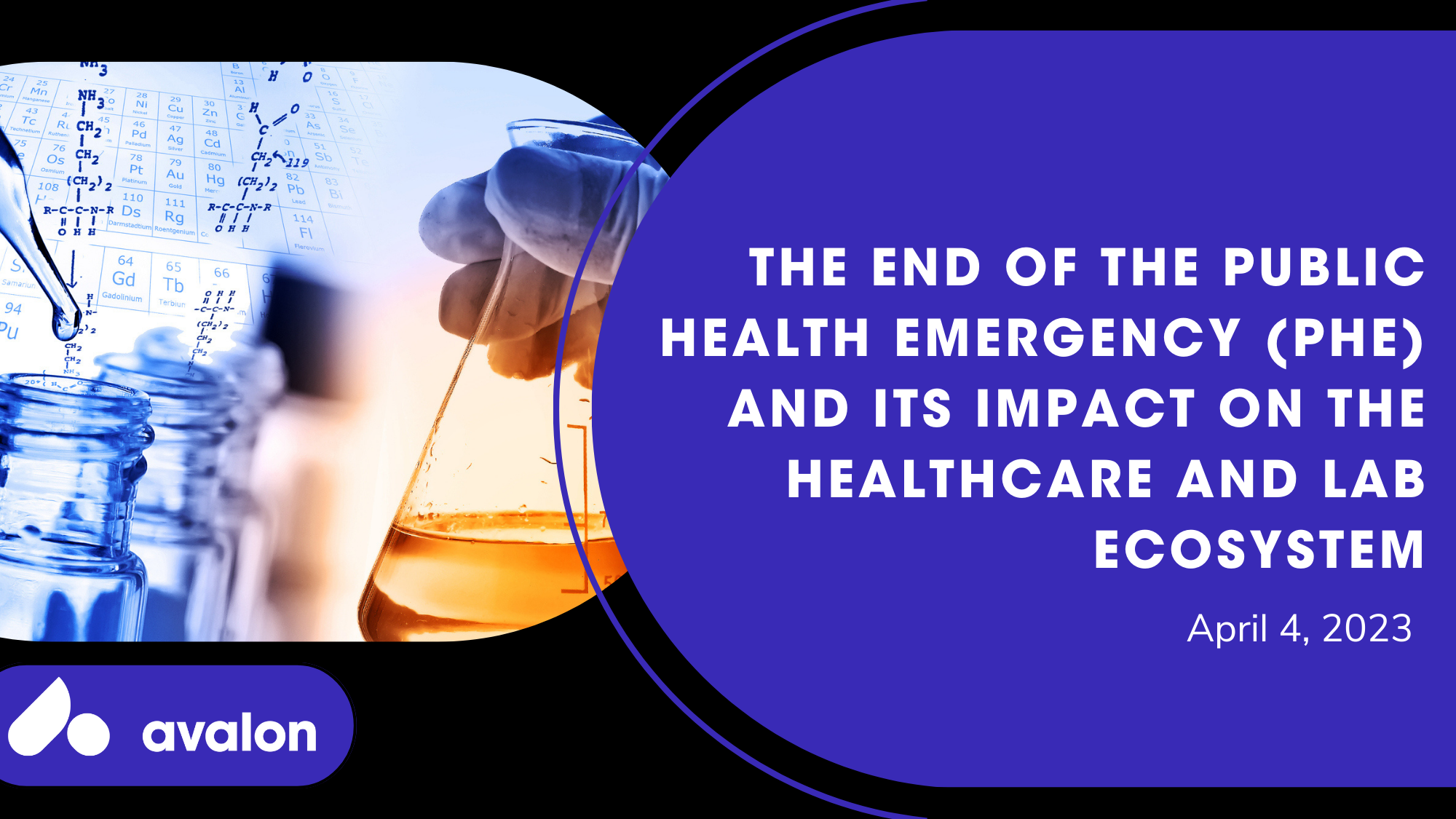Avalon Healthcare Solutions hosted a webinar on the end of the Public Health Emergency (PHE) and its Impact on the Healthcare and Lab Ecosystem. Julie Barnes, the principal of Maverick Health Policy and Eric Schiavone, Director of Maverick Health Policy kicked off the webinar highlighting the PHE policy end timing, a snapshot of expiring rules and the response by health plans to these complex uncertainties. Dr. Ben Horton, Avalon’s Medical Director spoke to the evolution of COVID-19 lab policy changes and Avalon’s response during the pandemic. Mike Snyder, EVP Network at Avalon wrapped up the session discussing the important changes to COVID-19 testing including the impact to coding, reimbursement, and lab trends.
PHE Policy Changes
Timing, timing, timing- When does the PHE expire? The White House announced the end of PHE to begin May 11, 2023, but the US House and Senate passed a bill to end the PHE earlier. Currently, President Biden has not signed the bill and congress is not in session. There is confusion and lack of clarity of when the PHE will actually end- it could be immediately.
What we do know is what provisions will expire on May 11, 2023, or sooner. These include:
- Cost sharing for COVID tests
- Free COVID tests
- Public posting of cash prices for COVID tests
- Medicare payment of $100 per COVID test
- Medicare waiver of a physician needing to order a COVID test
- Reimbursement for out of network providers for COVID-19 vaccination and testing
- Medicare’s waiver of a physician needing to order a COVID test
- Medicare’s 20% add-on payment for hospitals for each COVID-19 patient
- Medicare’s nominal specimen collection fee for labs to send techs to a beneficiary’s home to collect COVID-19 test samples
Maverick also flagged one other important note about lab tests. The ACA requires plans to cover lab services as an essential health benefit (EHB) which does apply to COVID-19, but plans may impose cost-sharing, limit coverage to in network providers, limit numbers of tests and/or require a prescription or physician order.
Importantly, the Medicaid redetermination and continuous enrollment provision that was put in place to ensure Americans had insurance coverage during the pandemic; though not directly related to the PHE, also ended on March 31, 2023. We saw a record number of Medicaid enrollees due to the continuous enrollment provision. The end of this coverage requirement will leave many people uninsured.
PHE provisions expiring at the end of 2023, or some other day, include reimbursement parity for telehealth, certain telehealth flexibilities, acute care hospital at home program, FDA Emergency Use Authorizations (EUAs) and in-person requirement for prescribing controlled medications.
It is important for health plans to understand how they can help employer groups and prepare their member services teams with messaging on the impacts of the PHE ending. Health Plans need to communicate changes being made to health benefits, cost- sharing, extension of timelines for special enrollment, and COBRA elections as well as any state laws that may alter the end of PHE changes. Official government resources and guidance to help organizations plan for the end of PHE were provided.
Avalon Policy Development Process and Response
Avalon was in the trenches early on leveraging our Clinical Advisory Boards early involvement in the pandemic, keeping informed on testing methodologies, strategies, and accumulating evidence. Avalon began developing the COVID-19 policy in Q2 2020 with quarterly policy updates occurring throughout the pandemic. In addition, Avalon hosted regularly scheduled webinars to inform clients and the market on the evidence and changes as they were evolving. Early in 2023, Avalon presented the updated COVID policy to clients for adoption at the end of the PHE.
A deeper dive on Avalon’s Coronavirus Testing in the Outpatient Setting policy was reviewed. This included indications, limitations of coverage and the extensive scientific research supporting the coverage criteria.
COVID-19 Testing, impacts of ending PHE to Coding, Reimbursement, and Lab Trends
The ending of PHE will not affect all groups equally- lab providers will have a reduction in reimbursement, payers will be released from the special payment flexibilities and go back to business as usual, and for patients, it goes back to confusion on coverage criteria and healthcare complexities.
PHE changes impact COVID testing reimbursement and the data trends support this decrease of COVID testing with continuing decline through 2022. Also, an important trend to keep an eye on is an increase in multiplex testing which includes the combination of COVID and influenza testing. These combined tests did not have reimbursement changes with the PHE ending so we should expect these testing to prevail and be the primary testing going forward.
Conclusions and observations to consider with PHE ending include:
- Health plans are no longer obligated to reimburse labs for COVID-19 testing at 100% of billed charges
- Member cost share is back. This includes the ability of the health plan to pay OON providers within the defined member benefits (e.g., no reimbursement or at an increased cost share)
- Plans should monitor the utilization of respiratory panels
- Plans should carefully review a lab’s utilization before adding the lab to the participating network
- Remind members that Direct Access Testing (DAT) may not be covered
A reminder that the value of laboratory testing will not be diminished with the end of the pandemic and PHE. Lab testing maintain relevancy, with over 70% of treatment decisioning based on laboratory testing. In closing, Avalon is accelerating the adoption of lab science —providing lab insights to identify overuse, misuse, and underuse of lab testing, and ensuring the right lab tests results in the right care.

